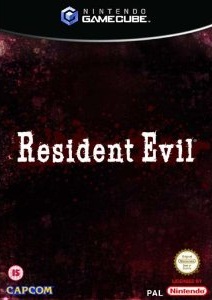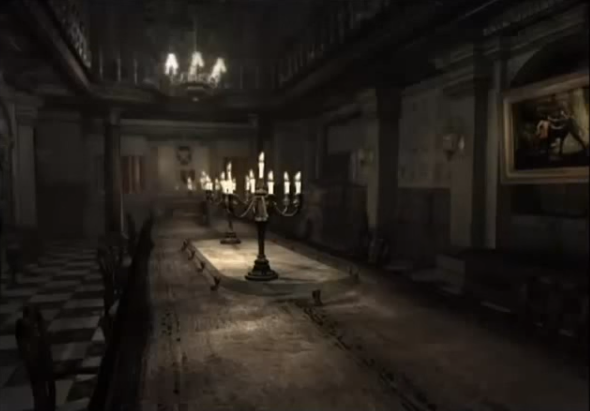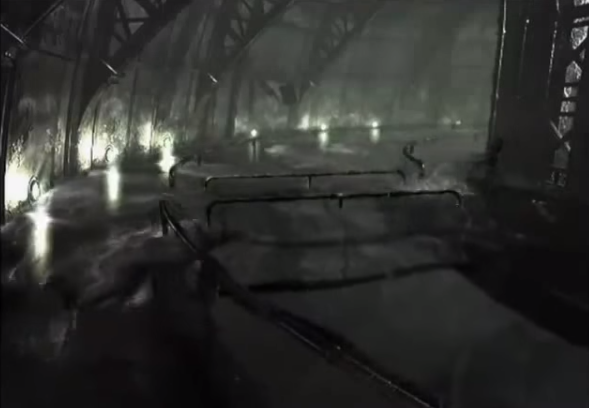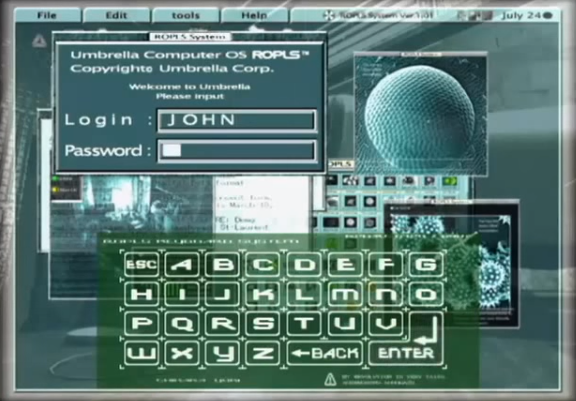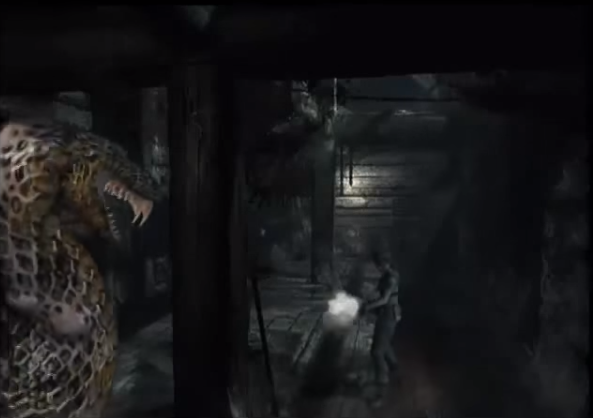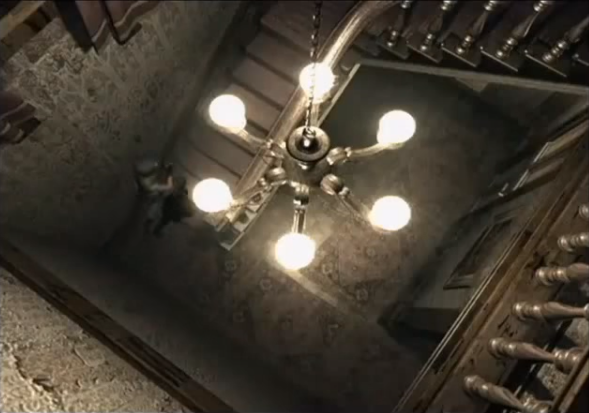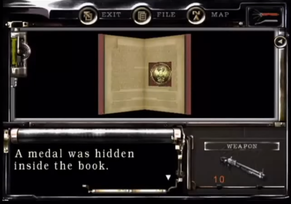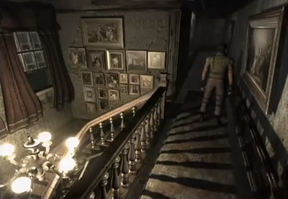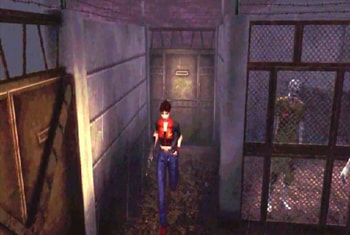RESIDENT EVIL (GC)
Those with memories long enough to recall Resident Evil: Director’s Cut, a 1997 space filler that existed primarily to distract from Resident Evil 2’s troubled development process, will likely have harboured some scepticism towards Capcom’s 2002 horror remake. DC promised much for die-hards, but ended up cheerfully relieving them of their £40, all for the sake of a few new camera angles and a double ammo option. Fortunately for the GameCube remake however, gamers were met with an adventure so good that it warranted classic status in its own right.
A great remake requires a great original of course, and in this regard, the developers were very much in luck. At a time when Capcom’s own gaming lineage was evolving to accommodate more streamlined, straightforward action fare in the form of Devil May Cry and Onimusha, Resident Evil provided a timely reminder of the more involved, fully-rounded action games that had risen to prominence in the second half of the nineties. It also extoled what stronger hardware could bring to the table. It’s exclusivity to the GameCube was undoubtedly a surprise at the time, and whilst the GC’s D-Pad is a bit useless and the analogue stick not completely suited to the distinctive “tank” controls, the decision to develop the game to the specifications of a single format paid dividends, as few sixth gen games would ever look as good, or run as well, as RE.
A perfect example of the ‘same but better’ motif that permeates Resident Evil’s design lies in its sumptuous graphics. The iconic mansion is unerringly faithful to the original, yet whilst nostalgia buffs will feel completely at home, there’s also that little something more, something new, lurking round every corner. The colour-starved visuals, which give prominence to flickering candles and brooding shadows, lend the remake a grittier, gothic quality. It looks absolutely outstanding; rich, sharply-rendered backdrops are well within RE’s comfort zone, allowing the game to extol quicker screen transitions and fantastically convincing, grizzly zombie animations. Classic moments are recaptured and refined with aplomb; the opening zombie reveal forms a perfect parallel to the collective trauma so many will remember of encountering the first undead, whilst the giant tarantula boss is somehow even more skin-crawling, and remains one of the most genuinely unsettling encounters you could hope to experience in a video game.
With essentially the same modus applied to the gameplay, RE not only recreates the original in its entirety, but audaciously expands the playing environment, doing so without ever breaking the illusion of nostalgia. This isn’t a reductive reminiscence; it isn’t a museum piece for fans to coast through, occasionally muttering “I remember that”. New corridors and new rooms serve to flesh out what was already a sizable adventure, and there are moments when the blur so convincing, you’ll struggle to remember what’s new from what’s not. Not only does it rebuild the adventure in shinier, more modern clothing, but through new or reworked puzzles, bosses and scenarios, RE gives the player the chance to appreciate all over again, the absorbing sense of trial and error, the finely-poised difficulty, the tension that made the experience so compelling. It’s a game that’s been tailor-made for fans of nineties survival horror; Capcom have succeeded in making a game that triggers all the right reminders without ever feeling predictable or out of sync.
Resident Evil also serves as a reminder of how unburdened gaming was by narrative obligation when survival horror was in its infancy. Plots were not beholden to realism, logic or water-tight canons, and as such, the remake is all the stronger for keeping with a straightforward yarn. More recent RE outings (including the well-received ones, such as Revelations) have a tendency to tie themselves in knots through unconvincing cinematic aspirations, leaving the player mired in everything from city lockdowns and military interventions, to mercenary intrigue and biological warfare. Resident Evil knows what it is however; a good old-fashioned B-Movie horror. It may seem incongruous to set such an adventure in a stately home, but it isn’t to fit a narrative agenda – its labyrinthine layout simply allows for fantastic gameplay possibilities. After all, we get the pleasure of a memorable attic encounter with a giant serpent, who needs no stronger reason for occupying said roof space other than it makes for a really cool boss fight.
Resident Evil also serves as a reminder of how unburdened gaming was by narrative obligation when survival horror was in its infancy. Plots were not beholden to realism, logic or water-tight canons, and as such, the remake is all the stronger for keeping with a straightforward yarn. More recent RE outings (including the well-received ones, such as Revelations) have a tendency to tie themselves in knots through unconvincing cinematic aspirations, leaving the player mired in everything from city lockdowns and military interventions, to mercenary intrigue and biological warfare. Resident Evil knows what it is however; a good old-fashioned B-Movie horror. It may seem incongruous to set such an adventure in a stately home, but it isn’t to fit a narrative agenda – its labyrinthine layout simply allows for fantastic gameplay possibilities. After all, we get the pleasure of a memorable attic encounter with a giant serpent, who needs no stronger reason for occupying said roof space other than it makes for a really cool boss fight.
Indeed, Capcom appeared to identify so meticulously with what made the original so appealing, they even retained the loveably rickety voicing. At first, the fleshed-out dialogue appears to have been remoulded just enough to avoid a 21st Century revisit of Barry’s “Jill-sandwich” line, or Wesker’s remarkable “Don’t open… that door!” delivery which, it has to said, was a wee bit disappointing. But just as you think it’s all getting a bit humdrum, the acting retreats into a kind of pantomime comfort zone that either shows the developers haven’t lost their sense of humour. Jill in particular is marvellously morose, sounding utterly untroubled by a series of nerve shattering events, overcoming the trauma of being held at gunpoint through a useful mix of small talk and a poor short-term memory. Still, we wouldn’t want it any other way.
Resident Evil’s successes are many, its shortcomings very few. The only new idea that doesn’t come good is the need to burn zombies in order to stop them reanimating and running amok later on. Don’t get me wrong, the concept is a logical one, but the need to carry a lighter and fuel canister (which only holds two doses before a refill is necessary) is not accommodated by the otherwise-excellent inventory system. Limited item capacity challenges the player to take a chance packing light, knowing that you might discover useful items as you progress. Using the burning method however slows progress to a crawl, and particularly with Chris’s game, it can feel like you’re spending as much time finding item drop-off points as you are moving the adventure forward.
Offering almost the perfect means of reintroducing a classic to a new generation of gamers, Resident Evil has transitioned from a fifth gen classic to a sixth gen gem that gamers right across the spectrum will appreciate. It looks incredible, is as challenging as ever, and features enough chin-scratching teasers to keep even seasoned gamers hooked for weeks. Fans could not have hoped for a better revisit. The highest praise you can afford this GameCube cracker is that this is likely the finest way to enjoy an essential horror adventure.
Resident Evil’s successes are many, its shortcomings very few. The only new idea that doesn’t come good is the need to burn zombies in order to stop them reanimating and running amok later on. Don’t get me wrong, the concept is a logical one, but the need to carry a lighter and fuel canister (which only holds two doses before a refill is necessary) is not accommodated by the otherwise-excellent inventory system. Limited item capacity challenges the player to take a chance packing light, knowing that you might discover useful items as you progress. Using the burning method however slows progress to a crawl, and particularly with Chris’s game, it can feel like you’re spending as much time finding item drop-off points as you are moving the adventure forward.
Offering almost the perfect means of reintroducing a classic to a new generation of gamers, Resident Evil has transitioned from a fifth gen classic to a sixth gen gem that gamers right across the spectrum will appreciate. It looks incredible, is as challenging as ever, and features enough chin-scratching teasers to keep even seasoned gamers hooked for weeks. Fans could not have hoped for a better revisit. The highest praise you can afford this GameCube cracker is that this is likely the finest way to enjoy an essential horror adventure.
|
Similar to...
|
VERDICT
Visual: 10/10
Audio: 8/10 Gameplay: 9/10 Longevity: 9/10 OVERALL: 9/10 |
